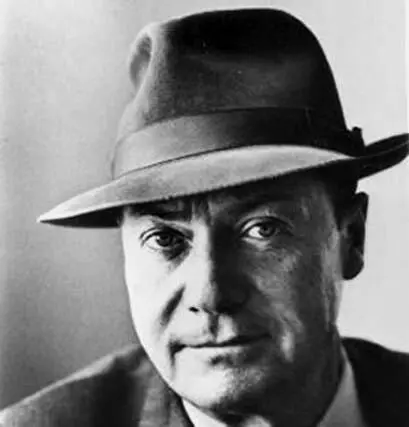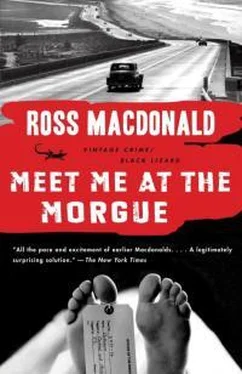Ross Macdonald
MEET ME AT THE MORGUE
(Experience with Evil)
1953

Ross Macdonald’s real name was Kenneth Millar. Born near San Francisco in 1915 and raised in Ontario, Millar returned to the United States as a young man and published his first novel in 1944. He served as the president of the Mystery Writers of America and was awarded their Grand Master Award as well as the Mystery Writers of Great Britain’s Gold Dagger Award. He died in 1983.
To my favorite in-laws
Dorothy & Clarence
I met the boy on the morning of the kidnapping. It was a bright and blowing day. The wind was fresh from the sea, and the piled white cubes of the city sparkled under a swept blue sky. I had to force myself to go to work.
A bronze-painted sports car with a long foreign nose was standing at the curb in front of the County Annex building. I parked in my regular space, a few yards behind it. So far as I knew, there was only one bronze Jaguar in town. It belonged to Abel Johnson. I wasn’t surprised when Fred Miner, Johnson’s driver, emerged from my second-floor office and started down the outside steps to the street.
Fred reached the sidewalk and turned in my direction, a stocky man in his middle thirties who walked with a peculiar stiff-backed roll. The faded Navy suntans he always wore had darker patches on the sleeve, where his Chief’s stripes and hash-mark had been removed. His only concession to his civilian occupation was a black, peaked chauffeur’s cap, which shadowed his eyes. He passed my car without seeing me, his face closed in thought.
There was a yelp and a flurry of movement from the sports car. A small boy with a head of bright red hair scrambled over the door and launched himself like a missile at Fred’s legs. The man’s face opened in a laugh of pure delight. Taking the boy under the arms, he swung him upside down in the air and set him back on his feet:
“Knock it off now, swabbie. This is no time for games. Come to attention.”
“Okay, Fred,” the boy chirped. “Aye, aye, sir, I mean.” He brought his feet together and arched his back.
“Now wipe that smile off your face or I’ll break you down to apprentice seaman and take away your privileges for fifteen years.”
“Aye, aye, sir.”
The boy giggled. Fred tried to repress a snort of mirth, and couldn’t. They stood on the sidewalk laughing into each other’s faces. Passers-by smiled at them.
I stepped out of my car. When Fred saw me his face changed. “Morning, Mr. Cross,” he said without enthusiasm.
“Hello, Fred. Looking for me?”
“I came in to see Mr. Linebarge.”
“He’s on his vacation.”
“Yeah, the little lady told me. I was up to your office already.”
“I thought you didn’t have to report until next week.”
“It wasn’t that. I didn’t come in to report. It was just a couple of questions I wanted to take up with Mr. Linebarge.”
“About your probation?”
He looked sheepish, and shifted his weight from one leg to the other and back again. Being on probation embarrassed Fred. “More or less. It wasn’t anything important.”
“Can I help?”
He backed away a step. “No, I wouldn’t want to bother you, Mr. Cross. I’ll be seeing Mr. Linebarge next Saturday, anyway. He’ll be back next Saturday, won’t he?”
“He will if he doesn’t drown. He’s gone on a fishing-trip.”
The boy reached up and tugged at Fred’s belt. “Is something the matter? Can’t we go on our trip?”
“Sure we can, Jamie.” He brushed the cropped red head with his hand. “Remember now, no talking in the ranks.”
“Is this the Johnson boy?” I said.
“Yessir, this is Jamie Johnson. Jamie, meet Mr. Cross.” He added with a trace of irony: “Mr. Cross is a very good friend of mine.”
The boy gave me a sticky hand. “Pleased to meet you, Mr. Cross. Any friend of Fred’s is a friend of mine.”
Fred’s face lit up, but he said in a quarterdeck voice: “You hustle back aboard now, before you talk yourself to death.”
The boy scampered back to the Jaguar and dove head first over the low door. The last I saw of him was a thin denim behind and a pair of kicking moccasins.
“He’s a bright youngster,” I said. “How old is he?”
“Watch it, he’ll hear you.” Fred crossed his lips with an oil-grained forefinger, and lowered his voice. “He shouldn’t hear himself praised too much, it might give him a swell head. It’s going to be tough enough on him with all the dough in the family. Jamie’s four.”
“He’s doing all right for four. Who taught him his manners?”
“He’ll get by. I make him toe the mark.” Fred started to move away. “Well, so long, Mr. Cross. Nice seeing you.”
“Hold it a minute. What’s up?”
“There’s nothing up,” he answered woodenly.
“The boy said you were going on a trip. You’re not leaving the county?”
“No, I’m not going anywhere.” He was a long time answering.
I was almost sure he was lying. “You know the rules. You’re not allowed to go out of the county without definite permission from our office.”
“I know it.” He colored uncomfortably. “I’m just taking Jamie for a ride. Is that illegal?”
“You’re not supposed to drive except in line of work.”
“I got my orders. That makes it work, doesn’t it?” He glanced nervously towards the sports car. “I ought to be on my way now, Mr. Cross.”
“Your way to where?”
His face had closed up completely again, into a mask of blank hostility. “I’m not supposed to tell anybody that.”
“Are you in some kind of trouble?”
“No sir, I’m not. I haven’t been in any trouble since February and I don’t intend to get into any trouble.” He said it with conviction.
“I’ll take your word for it, Fred. You’re all right as long as you don’t leave the county, obey the traffic laws, and stay on the wagon. You know what happens if you break those conditions.”
From the courthouse tower across the street, a bell began to sound the three-quarter hour. We both looked up at the tower clock. It was a quarter to nine.
“I know what happens,” he said. “I’ve got to shove off now, Mr. Cross.”
“What’s the hurry?”
He didn’t answer. The vibration of the bell still hung in the air above us like an echoing warning. He squinted up at the great iron-faced clock and shifted his feet impatiently.
“That’s a fast car,” I said. “What will it do?”
“A hundred and twenty, maybe. I never opened her up.”
“Remember to hold it down to fifty-five.”
“I’ll remember. Can I go now?”
I watched him climb into the driver’s seat of the Jaguar. It was a tight fit. Fred was thick in the chest and wide across the shoulders, and his back was stiff from being broken in the war. As he was maneuvering himself in under the low convertible top, I noticed the gun-shaped bulge in his hip pocket.
I wasn’t sure it was a gun. I didn’t know whether he had the legal right to carry one. Before I decided to stop him, the bronze car leaped away from the curb and disappeared around the corner of the courthouse. The fading sound of its motor was like an ill wind.
Ann Devon looked up from her typewriter when I entered the outer office. She was one of my two assistant probation-officers, a mouse blonde with a recent degree in psychology and large untapped reserves of girlish fervor. Turned in her chair against the light from the window, she made a very pleasant silhouette.
Читать дальше













